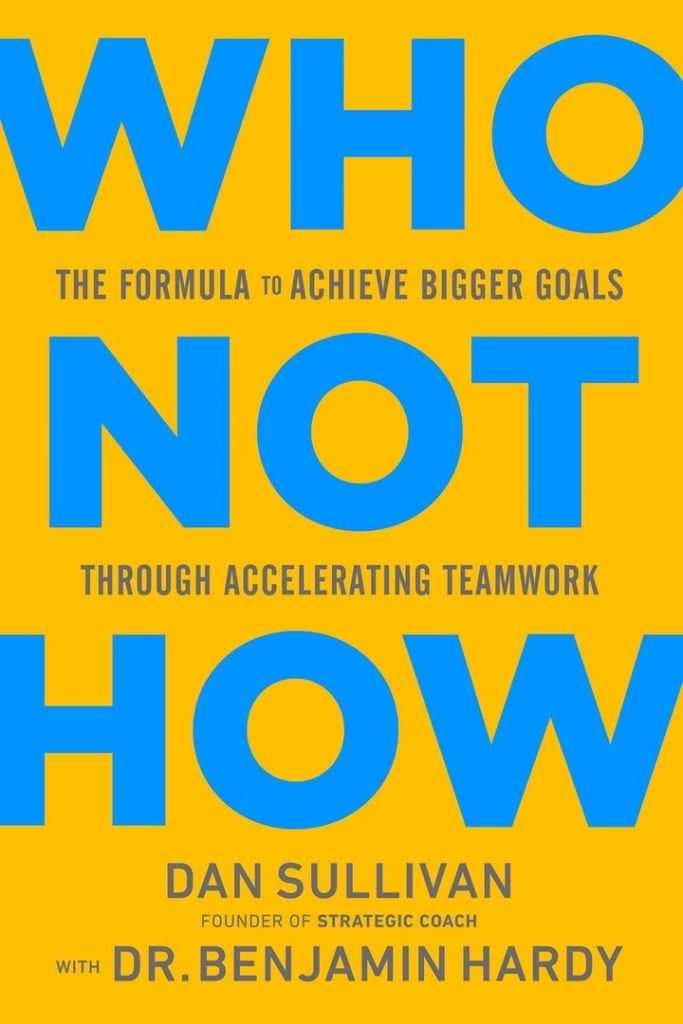Dan Sullivan
And what are you trying to accomplish? Do you have Whos in your life that give you the perspectives, resources, and ability to go beyond what you could do alone? Or are you keeping your goals so small to make them easier to accomplish them on your own?
Result, not effort, is the name of the game. You are rewarded in life by the result you produce, not the effort and time you put in.
How much better question is “who can help me achieve this?”
It is truly that simple. You define the vision, find the Whos, and let them create the result. That’s what real leadership is: creating and clarifying the vision and giving that vision greater context and importance for everyone involved. Once the what and why have clearly been established, the specified whos have all they need to go about executing the how. All the leader needs to do at that point a support encourage the Whos through the process.
You’re trying to accomplish something challenging or difficult that you’ve never done before, you probably need a Who. Let me say that another way: you absolutely need a Who if you are trying to accomplish something new and challenging, unless you’re fine not getting the result you want in the near future.
Your purpose and vision expand when you have powerful Who’s who can take your goals to places you couldn’t have imagined yourself.
The bigger vehicle come, the better Whos you’ll need.
Let the Who do the How.
If you’re going to apply higher levels of teamwork in your life, you’ll need to relinquish control over how things get done.
Transformational leaders give the vision and get out of the way.
A core aspect of leadership is being explicit about the vision. The more explicit you are in what you want, the faster you’ll attract the right who’s to help you achieve that vision. The leader explains the what and why and then allows the whos to execute the how.
The point is, as you engage in relationships, you expand your efficacy as a person.
This is of the core reasons why Who Not How is such an important mindset shift to experience. If you’re focused on doing everything your yourself, then you are dramatically limiting the resources you can direct towards your goals. If your resources are limited, your potential, your options, and your future are limited to. But as you combine your efforts with other who’s your efficacy immediately increases. Relationships are how you transform as a person. Relationships are how you transcend your current imitations. Relationships are how you produce results. Relationships are the purpose of life.
“Who can help me with this?”
“How can I eat better?” But he get himself to do it until he wanted to ask himself a different question. Then Toni switched his question to: who can help me eat better?
Research has found that teams who have high levels of autonomy, goal clarity, as well as little performance feedback, they actually perform worse than teams with low autonomy. However, when a team has high autonomy, hi goal clarity, and also gets regular feedback on the results, and their performance shoots through the roof.
Surround yourself people who remind you more of the future than the past.
You learn more about a leader by what they say No to than anything else.
Whatever your role, responsibility, or challenge, the sooner you communicate your needs the better.
Much rarer are stage four cultures, which emphasize teamwork and collaboration — focusing on the quality and characteristics of the group rather than the individual. Stage four cultures are far more productive and successful to stage three cultures in business in sports.
A keystone calm concept in psychology is known as the fundamental attribution error (also known as correspondence bias or over-attribution effect), which is the tendency for people to over emphasize a dispositional or personality based explanations for how a person acts while under-emphasizing situational explanations. In western culture especially, where we focus so much on the individual, there is a strong cognitive bias to assume that a person’s actions depend on what kind of person they are, rather than on the social and environmental forces that influence the person.
Nothing else that’s incredibly important when you get a who on your team who enhances the passions and purpose for everyone involved — they give you confidence to try new and bigger things.
